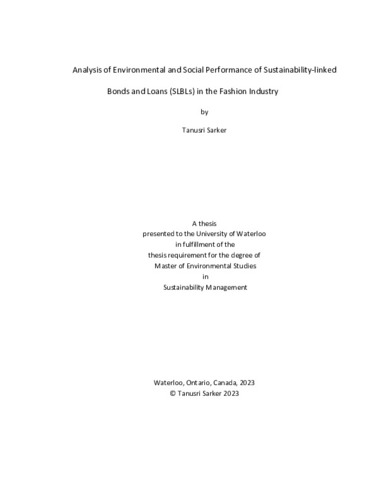| dc.description.abstract | The fashion industry has been criticized for its adverse effects on the environment and society. To address this, fashion retailers and brands are increasingly using Sustainability Linked Bonds and Loans (SLBLs) which aim to fund their operations in sustainability related activities and goals. However, there is a lack of academic research on the sustainability objectives targeted by these financial tool. Moreover, they are criticized for being driven by market participants rather than addressing sustainability concerns. This study aims to analyze the environmental and social performance of these SLBLs issued by fashion retailers and brands, using the Higg BRM, which is a comprehensive sustainability assessment tool which, using a set of questions and guidelines, helps companies measure and improve their sustainability performance solely for the apparel and footwear industry. The study used an exploratory sequential mixed method research approach, conducting content analysis of bond, sustainability and loan reports of SLBLs issuing fashion brands and retailers and coding based on the Higg BRM guideline. The findings suggest that three main sections of the Higg BRM namely brand, store, operations and logistics are primarily addressed through sub-sections related to the environment. 100% of SLBLs focus on reducing Greenhouse Gas (GHG) emissions, and nearly 65% focus on sustainable materials used in products. Other factors such as packaging and water and wastewater management are covered in around 30% and 20% respectively. However, other environmental issues like water usage, wastewater management, post-consumer waste, and social and human rights issues associated with the fashion industry have the lowest coverage on the Higg BRM scale.
In comparing information from sustainability reports, bond reports, and loan reports, the reports’ respective adherence to the Higgs BRM questions was explored. It was found that sustainability reports covered 2% more Higgs BRM questions overall compared to bond or loan reports. Regarding specific topics, bond or loan reports covered 53% of the questions related to GHG emission reduction, while sustainability reports covered 47%. In the product section, sustainability reports addressed 33% of the related questions, while bond or loan reports covered 26%. Similarly, in terms of water and wastewater, sustainability reports had slightly over 30% coverage, which was 10% higher than that of bond or loan reports. Finally, in terms of packaging and other sections, both reports had the same coverage numbers, 35% and 100% respectively.
Utilizing the study's findings will help the decision-makers who develop SLBLs in the fashion industry to develop SLBLs that emphasize broader material sustainability concerns. Furthermore, this research can aid institutional and private investors in gaining a clear understanding of the current emphasis placed on SLBLs within the fashion industry and be a catalyst to help bridge the gap between sustainability concerns addressed by SLBLs. This research will enhance the existing literature on sustainability finance within the fashion industry by presenting a comprehensive overview of Sustainable Linked Bonds and Loans (SLBLs) in this sector. Future researchers can leverage this study as a foundation for conducting in-depth investigations into investor behavior within the realm of SLBLs. | en |

